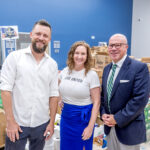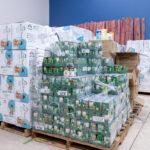
The rapid response by the United Way of Indian River County to the devastation brought about by the tornadoes spawned by Hurricane Milton has been a fitting example of its motto, Live United.
Multiple agencies, emergency support, law enforcement, city/county leadership, nonprofits, businesses and individuals have all united to assist with immediate needs while also raising funds to ensure those needs are sustained long term.
Meredith Egan, UWIRC CEO, said the Hurricane Relief and Recovery Fund has received nearly $1.9 million in pledges.
“That sounds like a lot but it’s definitely not enough,” she added.
As the storm barreled toward our area, Egan joined others at the Emergency Operations Center to work the ESF 15 (Emergency Support Function) desk. The United Way, she explained, serves the county in that function, organizing donations and volunteers during emergency situations.
“It was interesting to say the least. It gave us a direct line of sight and direct communication with community leadership as things were unfolding. And it became very clear that there was a lot of destruction,” said Egan, referencing the unprecedented damage from the sudden tornadoes that came while the hurricane was still far away.
“By midnight, we were already raising money and had established a Hurricane Relief and Recovery Fund. We’ve always had a partnership with the county and with our funded partners who understand that we will go out and raise funds to support any and every disaster and recovery work that’s going on,” she said.
“So that was really the big effort in the immediate.”
Egan said one of her first calls was to Jeff Pickering, CEO of the Indian River Community Foundation, who made a $1 million commitment.
“We know that it’s going to take a lot more than $1 million, but as a sign of support and credibility and awareness, we wanted to get a number out there that we felt was meaningful,” said Pickering.
“We’ve always recognized the United Way as the repository for any sort of disaster relief and recovery funds,” he added.
He explained that while disaster funds in some counties are administered through the Community Foundation, here it’s the United Way.
“When it comes to community trust and process, the United Way’s process for determining how to distribute funds in an emergency is one of the most transparent, and certainly one of the most effective, that is out there,” added Pickering.
He explained that its vast, trusted network of funders, community leaders and agencies guarantee that funds will be distributed in the most effective and efficient way possible.
“They’ve already got a really great, established process for doing that. We trust it, and that’s why we recommend people give to it,” said Pickering.
“I’m very proud of the fact that we work very closely together and hopefully this will make a difference. And the way that other charities have just raised their hand and said, ‘we’re here to help’ has been really tremendous,” he added.
Egan said the John’s Island Community Service League and John’s Island Foundation also made generous contributions to the fund, and others began donating through a website that had quickly been created.
On Thursday, United Way staff raced out to purchase hundreds of tarps, and volunteer teams from Habitat for Humanity and a Coast Guard Squadron were mobilized to install them throughout the county.
“Between Thursday and over the weekend, we put out about 200 tarps to the community and got those installed,” said Egan.
The next big undertaking was setting up a Multi-Agency Resource Center at the United Against Poverty UP Center, which opened the Monday following the storm, after its own storm damage was dealt with.
“We took the lead on coordinating with the county to get that approved, to get FEMA on site, and then of course to call in all of our funded partners and other service providers to have them on site providing services,” said Egan.
Matt Tanner, United Against Poverty executive director, said the original intent of the UP Center was that it would be a place to accommodate community needs.
“And this was probably the most beautiful case in point of that; to be able to accommodate 400 plus families a day, multiple agencies. It’s really neat to see it in action like that. We feel blessed to have it and to be able to do this for the community,” said Tanner.
In addition to the United Way and United Against Poverty, agencies within the MARC included FEMA, Red Cross, Salvation Army, Samaritan Center, Mental Health Collaborative, Substance Awareness Center, Veterans Council, Health Department, Treasure Coast Homeless Services Council, and Catholic Charities.
Tanner said an added benefit to having the MARC take place at the Up Center is that many of the people affected were already among the most vulnerable. This enabled them to become aware of the many programs and services available to them.
Agencies regularly on site include Treasure Coast Community Health, Dynamic Life, Right Life, Resource Center for Disability Solutions, Safe Families for Children, Florida DCF, CareerSource Resource Coast, Senior Resource Association and the AARP Foundation. The UP Center also houses its Member Share Grocery.
As soon as the MARC opened, UW and UAP staff and volunteers began assisting with the intake processes, parking, crowd control, and the organization and distribution of donated goods and supplies that came in by the truckloads from the Red Cross, Cajun Navy, the Food Bank, Catholic Charities and others.
In the immediate aftermath of the storm, the United Way partnered with the Jackie Robinson Training Complex to begin housing some 25 displaced families there. A care team saw to their mental and physical wellbeing, and provided toiletries, meals and other personal needs. Most have since been relocated to the Vero Inn and Suites through another partnership agreement.
The Mental Health Collaborative and the McCabe Connection Center also mobilized, opening up a trauma walk-in center and hotline.
“We’ve hired a couple of therapists to go out and meet with people. We’re working with a couple local therapists to provide space for one-on-one counseling or virtual counseling just to deal with some trauma,” said Egan.
While many childcare and after-school programs were able to get back up and running, one childcare center downtown was completely destroyed. Egan said they have been working to find a place for it to relocate so that those 80 children can remain together.
The United Way has established a voucher system that will pay for items such as food, clothing and furniture, even partnering with a few thrift stores. They have also arranged a prescription assistance program, replacing pharmaceuticals that were either lost, expired or spoiled during the storm.
Although the areas hardest hit by the tornadoes swath were around Central Beach, 14th Avenue in Downtown and the Highlands, Egan said the hurricane caused widespread flooding throughout other areas of the county.
As a result, requests for assistance are now coming in from people whose homes might not have had wind damage, but where flooding is now causing mold and mildew to set in.
“The United Way is here for the duration; this isn’t about one week. We want to ensure that every resident really is made whole as best we can with the resources that we have; to rebuild their lives and give them a sense of dignity and hope,” said Egan.
She said the hope is that through this process, we can build a more resilient community for the future.
“It’s going to take a lot of collaboration with local agencies, businesses, and volunteers to really provide that comprehensive relief that our community needs,” said Egan.
At the end of last week, once immediate needs were met, the MARC transitioned into the opening of a Disaster Relief Center at the IG Center, which is being operated by FEMA.
There is a continued need for donations and volunteers. For more information, visit UnitedWayIRC.org/Hurricane.
Photos by Joshua Kodis
- Matt Tanner, Meredith Egan, and Jeff Pickering.
- Matt Tanner, Meredith Egan, and Jeff Pickering.







